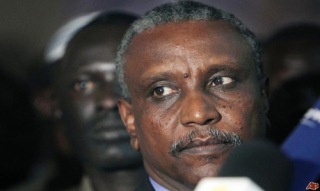Sudanese rebels say no humanitarian breakthrough in Blue Nile state
April 6, 2013 (KHARTOUM) – The Sudan people’s Liberation Movement-North (SPLM-N) has down played reports of a humanitarian breakthrough in Blue Nile state, where the UN recently began emergency food distribution, stressing that areas under their control are not included in the operation.

The agency is hoping to reach some 51,000 people in dire need of food assistance in Kurmuk and Geissan, which are among the worst affected areas of the conflict.
“While we continue to strive for access to all areas, this is still a major breakthrough which will enable us to assist those who continue to be displaced by the conflict”, WFP” Sudan country director Adnan Khan said in a statement on Thursday.
However, SPLM-N secretary-general Yasir Arman has minimised the operation, saying there is no major breakthrough in Blue Nile state.
He said Khan’s statement about a major breakthrough is “misleading” and “does not reflect the actual situation in Blue Nile state”, Arman said in statement extended to Sudan Tribune on Saturday morning.
“What took place is that Khartoum allowed the WFP to work in a limited area controlled by Khartoum and they made big news out of that”, he further said.
The conflict between the Sudanese army (SAF) and the SPLM-N, which started three months after violence erupted in South Kordofan, displaced thousands of civilians, with many fleeing to Ethiopia and South Sudan. According to reports emerging from the area, government warplanes continue to bombard rebel-held positions.
Khartoum refuses to allow foreign aid groups to open camps for displaced civilians in the Two Areas and has also prevented humanitarian access into the area, saying rebels fighters could potentially benefit from humanitarian assistance.
The two parties reached a humanitarian agreement in August 2012 sponsored by an African Union-led mediation team on the basis of a proposal made by the United Nations, African Union and Arab League. However, the deal was never implemented as both sides failed to seal a protocol on the mechanism for its implementation.
Arman underlined that Khartoum is still denying humanitarian access to SPLM-N areas in both states “where around a million of the civilian populations are being denied their right to humanitarian assistance and civilian protection”.
He further reiterated the SPLM-N’s call for a humanitarian agreement allowing for assistance to all civilians affected by the conflict.
“It is the real task at hand, not entertaining the gimmicks of Khartoum”, he added.
The rebel leader said his movement is willing to sign an immediate humanitarian cessation of hostilities allowing aid to reach conflict-affected civilians, create a suitable atmosphere for a political settlement and to consolidate the buffer zone recently activated on the border with South Sudan.
Khartoum had initially refused to hold direct talks with SPLM-N rebels, but indicated last month it was willing to enter negotiations with the group.
The Sudanese government has repeatedly demanded that Juba stop its alleged support of its former allies before it would agree to engage in direct talks.
The African Union mediation, which brokered the Sudan-South Sudan peace process, said it is preparing to start talks between the two sides in a bid to reach an agreement on the cessation of hostilities and humanitarian operations in the two areas.
(ST)
